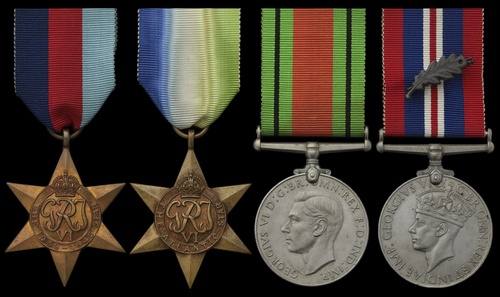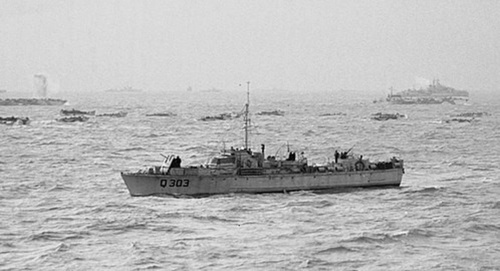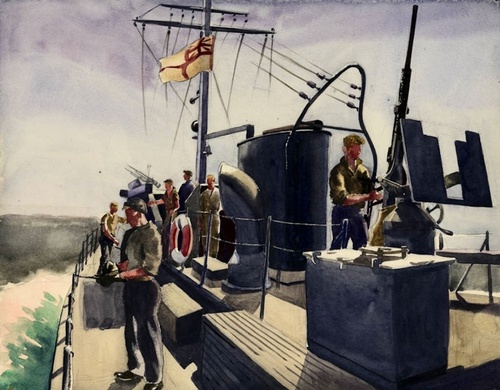Auction: 22003 - Orders, Decorations and Medals
Lot: 417
D-DAY AND BEYOND
'To those who were present that day [D-Day] and whose employment enabled them to move their ships with comparative freedom and to take avoiding action, the sight of groups of sweepers moving back and forth in immaculate formation, seeming to ignore everything but perfection of manoeuvre, was an inspiring sight. The job appeared almost cold-blooded in its exactness, and the explosion of mines set up by the sweepers seemed detached and an impertinence to such dignified progress … '
The R.N.V.R. - A Record of Achievement, by J. Lennox Kerr and Wilfred Granville, pays tribute the gallant work of the minesweeper flotillas off Normandy in June 1944.
A documented Second World War campaign group of four awarded to Able Seaman A. Wood, Royal Navy
A Coastal Forces man from the word 'go' - and having been borne on the books of Aggressive, Hornet and Midge - he was recommended for a 'mention' for the perilous minesweeping operations undertaken by M.L. 450 at the time of the Normandy landings
In the words of Rear-Admiral Alan Kirk, U.S.N., Commander of Operation "Neptune's" Western Task Force, the performance of the minesweeper flotillas was 'magnificent': they were 'the keystone in the arch of the entire operation'
Wood's recommendation for "Neptune" does not appear to have been approved but it mattered not for he was successfully recommended for another 'mention' for his 'courage, efficiency and devotion to duty' in M.L. 450's subsequent part in clearing the French Channel ports in September-December 1944
1939-45 Star; Atlantic Star; Defence and War Medals, with M.I.D. oak leaf, with Admiralty forwarding slip, in their original O.H.M.S. card forwarding box addressed to 'Mr. D. Wood, 45 Warrington Street, Stalybridge, Cheshire', good very fine (4)
Mention in despatches London Gazette 26 June 1945.
Albert Wood was born at Stalybridge, Cheshire on 19 June 1907 and is listed in the 1939 Register as working at Roadstone Quarries, likely in a reserved occupation. Hence his delayed entry into the Royal Navy as an Ordinary Seaman in September 1942.
Having then attended the Coastal Forces training establishment St. Christopher at Fort William, Scotland, he was borne successively on the books of Aggressive at Newhaven, Hornet at Gosport and Midge at Great Yarmouth. And it was at the latter base that he joined M.L. 450, a Fairmile B, in April 1943, and he remained likewise employed until January 1945.
Leading the way - Coastal Forces 'minesweeper'
Commanded by Temporary Lieutenant J. R. Armstrong, R.N.V.R., M.L. 450 was reverted to a minesweeping role for Operation "Neptune", joining the 1st Motor Launch Flotilla, 18th Minesweeping Force.
And it was to the Allied minesweeping flotillas that fell the honour of leading the way for the great Armada that departed the U.K. on the night of 5-6 June 1944, a perilous and dubious privilege upon which the fate of the D-Day landings rested. And very much upfront were the wooden-hulled Motor Launches of Coastal Forces, who were charged with sweeping ahead of their larger and better protected consorts.
Remarkably, by 0330 hours, all ten planned channels had been successfully swept and, over the next few days, M.L. 450 and her fellow 'sweepers' assisted in establishing the 'Trout Line', namely a major swept corridor leading to the beaches. As cited above, Wood was duly recommended for a 'mention':
'For outstanding zeal, endurance and devotion to duty during the assault and later minesweeping in Operation Neptune' (TNA ADM 199/900, refers).
As cited above, this recommendation appears to have got lost in the works, but three of his shipmates in 450 were indeed mentioned in despatches for "Neptune" (Seedie's refers).
An indication of the tense nature of such work is to be found in the words of Lieutenant Julian Ward, R.N.V.R., who in common with Wood and his shipmates was similarly employed on minesweeping duties off Normandy on the night of 5-6 June 1944:
' … The first explosion came quickly. You could feel it, even before you heard it, by the thud in the steel plates beneath your feet. Several more followed, some distant, some very close, one after the other. The Petty Officer said, "If you ask me, sir, we're in amongst 'em now." The ship heeled violently and suddenly, so that I had to catch hold of a stanchion to keep my balance. I knew that we had swerved to avoid a floater. Some one said, his voice high and sharp, "There it is, there it is."
I leaned over the guardrail and the mine was almost below me, bobbing and turning down the ship's side so that it seemed certain one of its horns must touch. We heeled the other way, swinging our stern away from it. I shouted, "Get the other side of the deck. Get under cover." I jumped behind the drum of a winch, feeling prudent but undignified. The mine swirled away into the darkness and was lost.
The voice of the look-out posted in the bows wailed out sadly, or sometimes squealed agitatedly, as he reported mines looming up in the darkness ahead of us. From the bridge I could hear a low, swift mutter of sharp orders. More and more mines floated past, some several feet away, some very close. I felt the fear settle in my stomach like a sickness. I pictured the ship going up in a roar of orange flames, and men in the black water calling up to us, and I wished if anything was going to happen it would happen quickly. We steamed on through the mines and I stood shivering on the quarterdeck, wishing that it was over, and feeling that a man as frightened as I should never have come on an expedition such as this. I felt it was a big mistake on somebody's part to have sent me. I began to feel, besides fear, resentful and filled with a bitter grievance against Authority in general … '
The Wavy Navy - By Some Who Served, edited by J. Lennox Kerr and David James, refers.
Opening of the Channel Ports
M.L. 450 continued to carry out similar operations off the north coast of France following the landings and Wood was mentioned in despatches for the period 14 September to 12 December 1944:
'For courage, efficiency and devotion to duty during arduous minesweeping duties leading to the opening of the French Channel ports' (TNA ADM 1/30330, refers).
His skipper, John Armstrong, was awarded the D.S.C. on the same occasion, the covering report referring to M.L. 450 and her consorts having performed good and hazardous service in the clearance of the ports of Dieppe, Le Havre, Boulogne and Calais. The report also states:
'The initial sweeping of the River Seine to Rouen was particularly difficult and hazardous owing to obstructions, moored anti-sweeping devices and navigational difficulties.'
Nonetheless, in this operation alone, 28 enemy moored mines were swept and cleared, thereby making a vital contribution to the fortunes of the Allied advance
Departing M.L. 450 in January 1945, Wood served a six-month stint at the Immingham base Beaver II, prior to re-joining 450 in July 1945. He was released 'Class A' in March 1946 and died at Ashton, Lancashire in October 1972.
Sold with the recipient's original parchment Certificate of Service, together with a Certificate for Wounds and Hurts, dated 19 July 1945, this signed by Wood and M.L. 450's skipper, John Armstrong, and issued as a result of him having received a head injury.
Subject to 20% VAT on Buyer’s Premium. For more information please view Terms and Conditions for Buyers.
Sold for
£140
Starting price
£130









